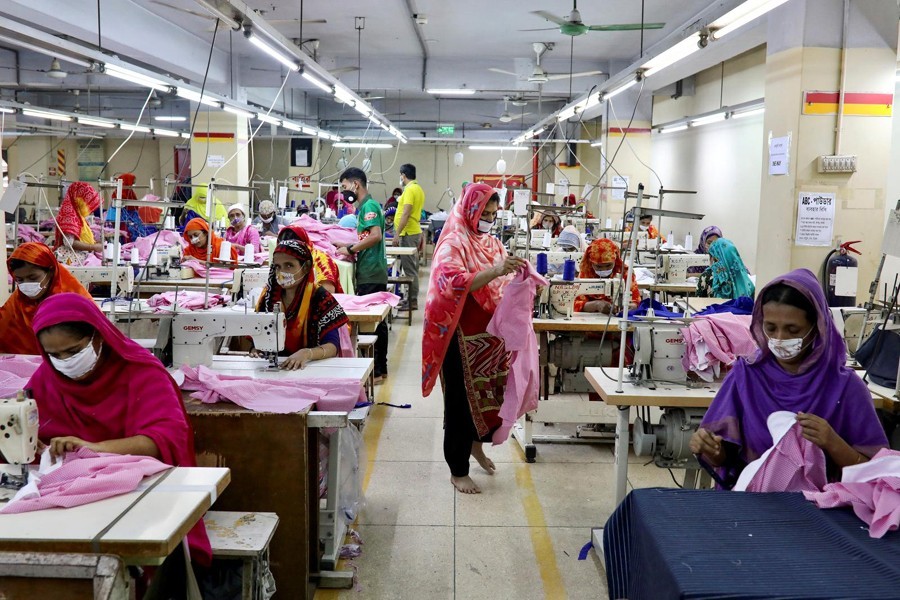Experts have suggested taking prudent steps to control pollution and accelerate efforts to mitigate climate change (CC) impacts, as a recent global report said Bangladesh is losing about US$6.0 billion due to lower labour productivity.
A US-based organisation - The Adrienne Arsht-Rockefeller Foundation Resilience Centre (Arsht-Rock) - in the report also said the loss is estimated to be more than 8.0 per cent of its annual labour output.
This could increase to 10 per cent by 2050, if immediate initiatives are not taken, it stated.
The report - 'Hot Cities, Chilled Economies - Dhaka, Bangladesh' - assessed the social and economic impact of extreme heat in 12 cities around the world, including Dhaka.
It revealed that labour productivity of the people in Dhaka is affected more than any other city due to extreme heat.
Other affected cities, such as Abu Dhabi and Bangkok, are more exposed to heat stress, while Dhaka is unusually vulnerable to its effects, due to its labour-intensive economy and low rate of active cooling, according to the report.

Worker protection projects, such as the Red Cross/Red Crescent's FbF solution, can be scaled up to provide broad-based social insurance against extreme heat for vulnerable workers.
The report also suggested investment in the built environment and nature-based solutions.
Talking to The Financial Express, Professor of Chemistry Department at Dhaka University Abdus Salam observed that both global warming and local pollutions, mainly caused by manufacturing and transport sectors, and brick making are mostly responsible for the extreme heat and temperature.
The government should take immediate actions to curb all sorts of pollutions in this regard. Though the country is enacting laws and taking some actions, but higher focus should be on enforcement and execution, he pointed out.
Professor Salam also said Bangladesh should look for the ways to use environment-friendly sulphur fuel to a great extent to curb pollution.
He underlined the need for using eco-friendly electric vehicles and alternative fuels to reap better benefit.
Apart from Dhaka, the 11 other assessed cities were - Athens (Greece), Bangkok (Thailand), Buenos Aires (Argentina), Freetown (Sierra Leone), London (United King-dom), Los Angeles (United States), Miami (United States), Monterrey (Mexico), New Delhi (India), Santiago (Chile), and Sydney (Australia).
The average loss across the 12 cities was $44 billion in 2020. If measures are not taken to reduce the temperature, this loss could reach $84 billion by 2050, it said.
Agreeing to the report findings, Sharif Jamil, General Secretary of Bangladesh Poribesh An-dolon (environment movement), suggested changing the mindset of policymakers right at this moment after recognising economic and public health impacts.
He urged the government to collaborate and coordinate with the stakeholders concerned, including technical experts, while enacting news policies and laws to reap better benefit of them.
These losses capture only direct impacts on output, but the lost wages and output also have indirect effects on the wider economy, as overall spending declines and affects the economic activities that are not exposed to heat, as per the Arsht-Rock report.
Low-income workers are especially exposed to heat - in sectors such as garment manufacturing, transport, and retail trade, and the losses already amount to around 10 per cent of income.
The report also stated that the losses are expected to be concentrated in sectors - such as manufacturing and logistics, which already lose $1.5 billion (BDT 132 billion, or 9.0 per cent of sectoral output) and $1.8 billion (BDT 158 billion or 10 per cent of sectoral output), respectively.
Losses in manufacturing are likely to be particularly high in sectors such as garment manufacturing or brick making, where proximity to machinery or ovens increases the temperature to which workers are exposed, the report added.


